
views
Writing the Beginning
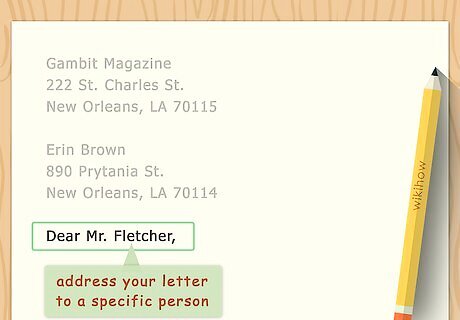
Address your letter to a specific person. Because you're familiar with your company, writing the letter to a particular person is imperative. Addressing letters of interests to "the HR Department" will not make your letter stand out or seem professional. If a position has recently opened up, write the letter to those in charge of hiring. If one hasn't, write the letter to your supervisor. Include their abbreviated professional title (e.g. "Dr.") if relevant. If you have worked a long time with this person and know them well, you could address them by their first name. You might write, for example, "Dear Dr. Norris," or "Dear Leslie," depending on your relationship with this person.
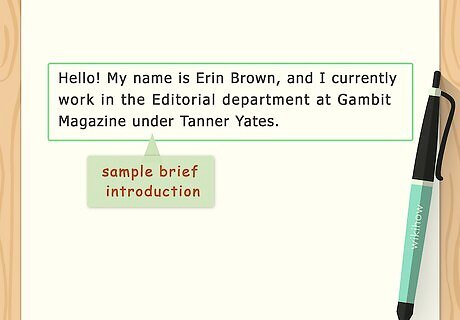
Briefly introduce yourself. In large companies, the head of department who will read your letter might not know you personally. State your name and current position within the organization. Include who your current supervisor is, as this can be a point of connection. A sample introduction might sound like: "Hello! My name is Jocelyn Rogers, and I currently work in the IT department at Tennison Bank under Tanner Yates."
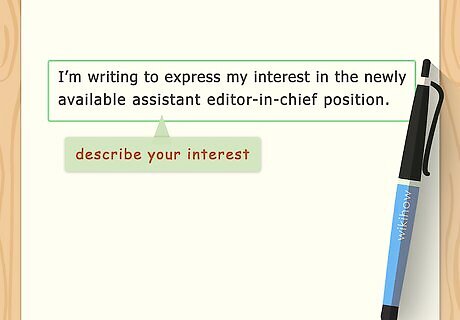
Describe your interest in the position. If you know a position has opened up around your company, state your interest directly. Write a brief sentence about why this position appeals to you. If no such position has opened, explain that you're interested in a promotion and why this appeals to you. Keep your tone professional, but express enthusiasm. You could say, for example, "I noticed that our department is looking for a new Assistant Manager. One of my professional goals is to obtain a supervisor role, and I'd love to be of consideration for the position." If you're writing for a general promotion, you might say, "I've been working here for five years as a customer service representative. While I've enjoyed this position, I'm hoping to transition to a leadership role."

Frame it around the company's best interest. While you should show personal interest in the position, ultimately companies want to hire the best fit for the vacancy. Write a sentence about how you feel you could make a difference in a higher position. Don't get too detailed, as you'll have space for that in the body of the letter. Instead of writing about why you need a promotion, focus on how your skills will benefit the department.
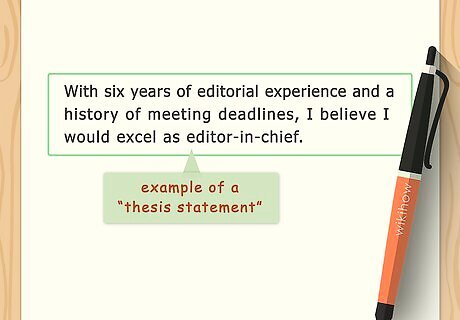
Include a "thesis statement." Wrap up the introduction with a one-sentence statement on what makes you an excellent candidate, which you can expand on in the next paragraph. Choose the most relevant qualifications to spark your employer's interest in reading on. An example of a "thesis statement" looks like: "With six years of editorial experience and a history of meeting deadlines, I believe I would excel as editor-in-chief."
Crafting the Body

State your qualifications. After the introduction, include one or two paragraphs about your relevant skills for this promotion. Each paragraph should be around 4-6 sentences long. A letter of interest should be detailed but concise. Any more than two paragraphs, and you risk losing your employer's attention. Suppose that you're working in the computer technology field. You could, for example, list which coding languages you know, what projects you've worked on, or your familiarity with relevant fields (like web development).
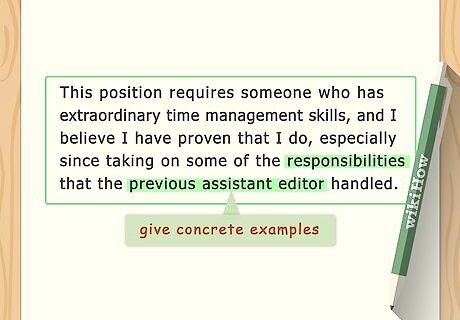
Give concrete examples of your skills in action. Writing that you are self-motivated and experienced will only go so far. Briefly write about an experience where you exhibited relevant skills for the position. If you're asking for a sales-related promotion, for example, you could talk about a team project that boosted your company's revenue.
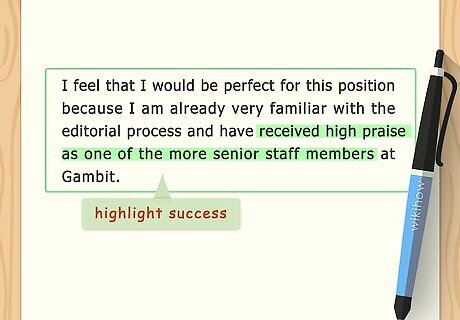
Highlight successes during your tenure. You have likely spent time in this business if you're asking for a promotion. Give examples showing how you've been a company asset so far. In at least one of the paragraphs, write about a key achievement and how this spotlighted your skills. You might say, "I know that this vacancy involves conflict-resolution skills. As a peer mentor, I've acted as a mediator in many student-related disputes. As of this November, I've spent eight months in this position. Working as a peer mentor has taught me to see both sides of an argument and help others reach a compromise."
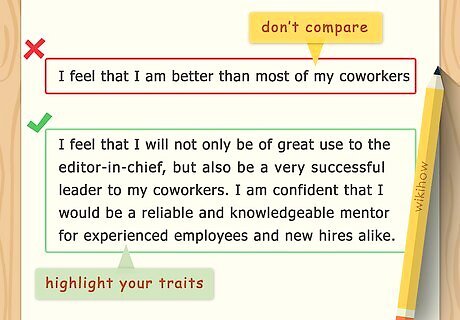
Avoid comparing yourself to your coworkers. Other colleagues might apply for a promotion as well, especially if you work in a large department. Resist the temptation of putting your skills above others or implying you deserve a promotion because another worker received one. You'll make a more compelling argument by emphasizing your strengths.
Closing the Letter

Express gratitude. Showing gratitude in the last paragraph is the equivalent of shaking someone's hand after an interview. Thank your employer for their consideration and time spent reading this letter. Write about how much you've enjoyed working for this organization as well. You could say, "Thanks so much for your time. I've greatly appreciated working on projects with you and the rest of our team."

Include professional references. Should you have any letters of recommendation on file, you could attach them to your email and mention that you've done so. If not, you could include the name of your business supervisor or colleagues who've worked with you. As an alternative, you could mention that references are available upon request.
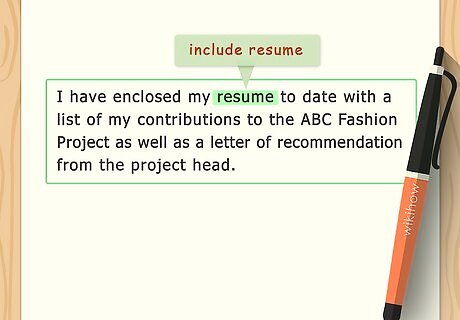
Attach your resume or CV. Update your resume or curriculum vitae (CV) to include your highlights while working at this company. Mention that you've attached the resume as a file in your closing paragraph. Save this file as a PDF to make sure the resume/CV is accessible.
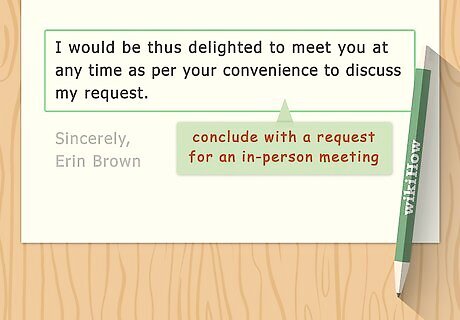
Conclude with a request for an in-person meeting. After you've thanked your employer, ask if you could schedule a meeting to discuss this promotion. Include your contact information so they can easily get ahold of you, and let them know what the best way to reach you is. EXPERT TIP Elizabeth Douglas Elizabeth Douglas CEO of wikiHow Elizabeth Douglas is the CEO of wikiHow. Elizabeth has over 15 years of experience working and managing teams in the tech industry. She has held roles in multiple areas, including computer engineering, user experience, and product management. She received her BS in Computer Science and her Master of Business Administration (MBA) from Stanford University. Elizabeth Douglas Elizabeth Douglas CEO of wikiHow In-person conversations can give you more insight into how you might get that promotion. Elizabeth Douglas, CEO of wikiHow, advises: “At different companies there are different rules. But, in most cases, I would go talk to your manager and inquire about what it would take for you to get that job, get feedback, and demonstrate your interest in being promoted."
Sending It at the Right Time

Send your letter before your scheduled performance review. Annual (or semi-annual) reviews are the perfect time to discuss how your career is going and where you want to see it go. Email your supervisor the letter a few days in advance. Ask in the closing paragraph if you could discuss the letter during your review.

Keep tabs on company vacancies. Your employer will be more open to promotions if they're looking to fill a position. Send a letter of interest once you hear that your business is looking for a new employee. Hiring within the organization might be in your employer's best interest.

Wait until after you've spent enough time with the company. The right time to ask for a promotion varies for everyone. Six months might be right for one situation, but six years might fit another better. Once you've completed several successful projects or have met success in your career, decide whether you're ready for a higher position.

Make positive relationships with your colleagues first. Establish yourself in the company's culture before you ask for a promotion. Participate in team projects, and get to know your colleagues. Meshing well with fellow employees shows higher-ups that you work well with this organization. Ask for in-company recommendations before you apply. A letter of recommendation from a prominent colleague could open your employer's mind to your letter.




















Comments
0 comment